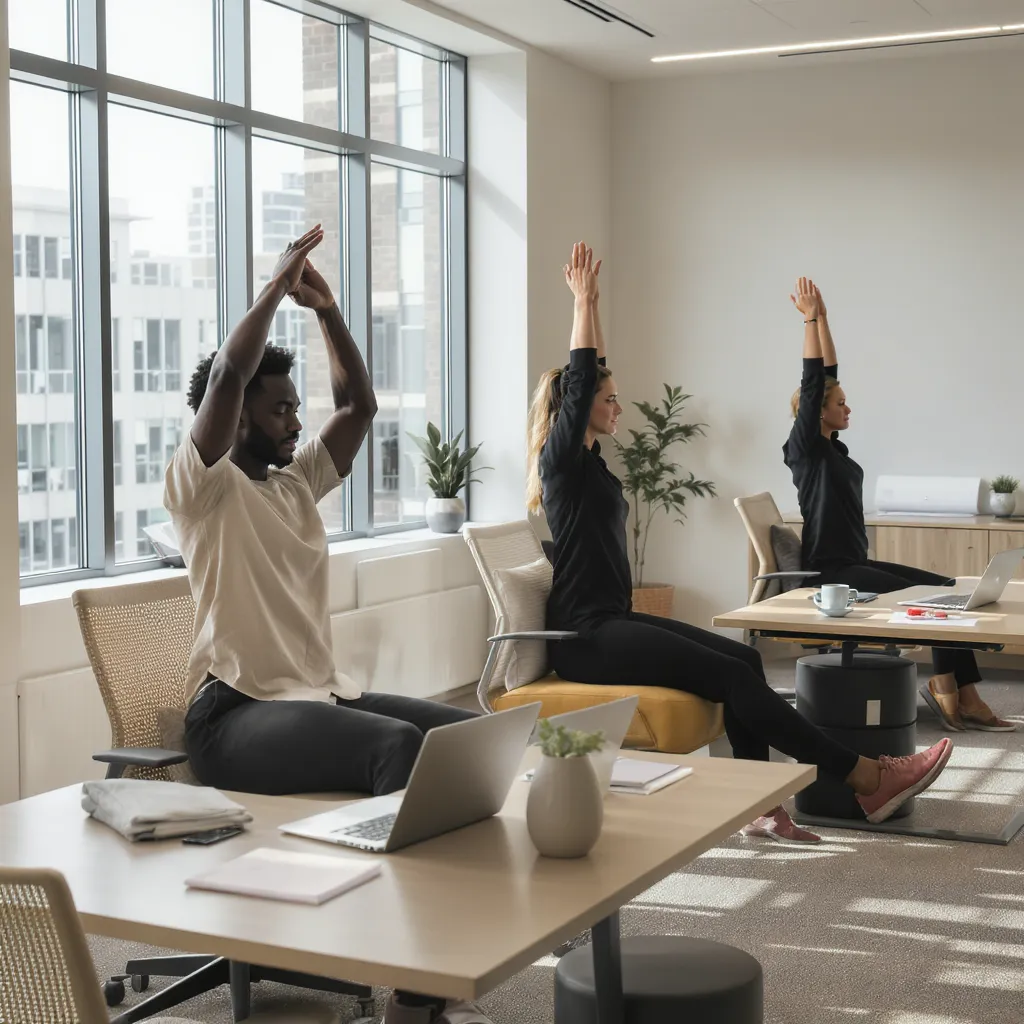
Flexibility Exercises to Improve Workplace Posture in 2025
Most office workers underestimate how much their posture affects not only their comfort but also their energy, focus, and long-term health. In 2025, with hybrid and remote work becoming the norm, posture problems are on the rise—especially among professionals who spend hours at their desks. This article explores flexibility exercises and posture strategies designed to fit seamlessly into a busy workday, helping office workers, HR professionals, and corporate leaders enhance wellness and productivity.
By integrating targeted flexibility exercises into your daily routine, you can counteract the stiffness from prolonged sitting, reduce back and neck pain, and improve your overall health. We’ll cover practical movements, workplace integration tips, and industry insights—plus case studies showing real improvements in employee well-being.
Why Flexibility Exercises Matter for Posture
Poor posture isn’t just about slouching—it can lead to musculoskeletal imbalances, decreased lung capacity, and even increased stress levels. According to the American Chiropractic Association, up to 80% of adults experience back pain at some point, often linked to prolonged sitting.
Flexibility exercises are one of the most cost-effective interventions for preventing posture-related injuries in the workplace.
Flexibility exercises lengthen tight muscles, improve joint mobility, and help maintain the natural alignment of the spine. When done regularly, they can reverse much of the damage caused by sedentary work habits.
| Benefit | Description | Impact |
|---|---|---|
| Improved Range of Motion | Increases mobility in joints and muscles | Reduces stiffness |
| Pain Reduction | Alleviates back and neck pain | Enhances comfort |
| Better Focus | Improves circulation and energy | Boosts productivity |
These benefits aren’t just physical—they translate directly into better work performance and reduced absenteeism.
Targeted Flexibility Exercises for Office Workers
Here are some flexibility exercises that can be performed at your desk or in a small office space:
1. Neck Side Stretch
Sit upright. Slowly tilt your head to the right, bringing your ear toward your shoulder. Hold for 20 seconds and repeat on the left.
2. Seated Spinal Twist
Cross your right leg over your left, place your left hand on your knee, and gently twist your torso to the right. Hold for 15 seconds, then switch sides.
3. Standing Quad Stretch
Stand and hold onto a desk or chair for balance. Pull your right foot toward your glutes, keeping knees close together. Hold for 20 seconds, switch sides.
For more posture-specific ideas, see 7 Desk Exercises for Better Posture.
Integrating Exercises into Workplace Routines
One of the biggest challenges HR professionals face is helping employees adopt these exercises consistently. The solution lies in ‘exercise snacks’—short, frequent breaks for movement.
By scheduling 2-3 minute flexibility breaks every hour, employees can maintain mobility without disrupting workflow. For HR leaders, integrating these into wellness programs is straightforward: add reminders in collaboration tools, encourage walking meetings, and provide training sessions.
Creating a Comprehensive Workplace Wellness Program offers more strategies for embedding flexibility and posture exercises into daily work culture.
The key to posture improvement isn't a single long workout—it's repeated, mindful movement throughout the day.
Case Studies: Workplace Posture Transformations
In 2024, a mid-sized tech company implemented daily flexibility breaks for its remote teams. Within six months, they reported a 35% decrease in posture-related discomfort and a 20% increase in reported energy levels.
Another example comes from a financial services firm that combined posture exercises with ergonomic desk setups. They found employees were more engaged and had fewer sick days.
| Company | Initiative | Outcome |
|---|---|---|
| Tech Solutions Inc. | Hourly flexibility breaks | 35% less discomfort |
| FinancePro Ltd. | Posture exercises + ergonomic desks | 20% increase in engagement |
These results demonstrate that posture improvement isn’t just a wellness perk—it’s a productivity driver.
Common Mistakes to Avoid
Even with good intentions, some workplace posture programs fail. Here are common pitfalls:
- Inconsistent Scheduling: Skipping breaks leads to minimal impact.
- Poor Instruction: Without clear guidance, employees may perform exercises incorrectly.
- Ignoring Ergonomics: Exercises alone won’t solve posture issues if workstations are poorly set up.
Addressing these requires both training and supportive infrastructure.
Future Trends: Posture and Flexibility in 2025 and Beyond
The future of workplace wellness is integrating technology with movement. Fitness trackers can now prompt employees to stretch at optimal intervals, and AI-driven posture analysis tools can provide real-time feedback.
Emerging research suggests that pairing flexibility exercises with mindfulness practices enhances both physical and mental health outcomes.
Implementation Guide for HR Professionals
To launch a posture-focused flexibility program:
- Assess Needs: Survey employees on posture-related discomfort.
- Provide Training: Offer short workshops on correct exercise form.
- Set Reminders: Use apps or internal messaging for break prompts.
- Track Progress: Monitor participation and health metrics over time.
For tailored advice, see Tailoring Exercise Snacks for Specific Job Roles.
Conclusion
Flexibility exercises are a simple yet powerful tool for improving posture, enhancing comfort, and boosting productivity in the modern workplace. Whether you’re an office worker looking for relief from stiffness, an HR professional aiming to reduce absenteeism, or a corporate leader seeking to improve team performance, integrating these movements into daily routines will pay dividends.
The key takeaway is clear: posture health in 2025 depends on consistent, mindful movement woven into the fabric of the workday. Start small, stay consistent, and watch both morale and productivity rise.
